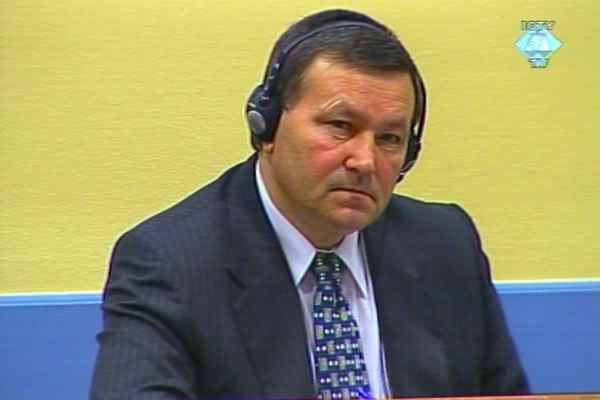Home
MARKAC’S FAILURE TO ACT IN OPERATION STORM
The Judgment of the Croatian Generals (8)
The judges sentenced General Mladen Markac to 18 years in prison, noting that Markac’s contribution to the joint criminal enterprise could be inferred from his participation at the Brioni meeting, where the plans were made to expel Serbs from Krajina. Markac also contributed to the joint criminal enterprise when he ordered the indiscriminate artillery attacks on Gracac and failed to punish the special police who committed crimes in Gracac, Donji Lapac, Grubori and other places in Krajina where civilians were killed and their property destroyed
 Mladen Markac in the courtroom
Mladen Markac in the courtroom The Trial Chamber with Dutch judge Orie presiding sentenced police general Mladen Markac to 18 years in prison for his involvement in the joint criminal enterprise aimed at the permanent elimination of Serbs from Krajina, in the summer of 1995. At the time, Markac served as deputy interior minister and was in charge of the special units. He commanded the joint police force that took part in Operation Storm in early August 1995, and the cleanup operations that followed it. During Operation Storm, Markac’s special police was part of the Split Military District, operating along the Dinara-Gracac-Donji Lapac line. Ante Gotovina was the commander of the Split Military District.
The judgment notes that Markac, like Gotovina, actively participated in the Brioni meeting on 31 July 1995, called by President Tudjman. According to the judges, the objective of the joint criminal enterprise – to eliminate Serbs from Krajina – was crystallized at the meeting. Markac then proceeded to order an unlawful attack on civilians by indiscriminate shelling of the town of Gracac in Lika. This was an ‘important element’ in the implementation of the plan. When the special police entered the liberated area, they committed numerous crimes. The Trial Chamber found that Markac failed to prevent crimes and prosecute perpetrators; he did not even remove them from their units. This omission was qualified in the judgment as contribution to the joint criminal enterprise.
As with generals Gotovina and Cermak, the Trial Chamber dismissed the allegations in the indictment that Markac took part in the joint criminal enterprise through ‘disseminating false information to cause the departure of Serbs’ and ‘creating and supporting discriminatory policies against Serbs’.
In the afternoon of 5 August 1995, Markac’s special units entered Gracac. According to the evidence accepted by the judges, the special units took part in the looting of Serb houses and the destruction of ‘a substantial part of the town’. At that time, Markac was in Gracac and, as noted in the judgment, the ‘only reasonable inference’ was that Markac knew what his subordinates were doing. Markac nevertheless did nothing to investigate the crimes and punish the perpetrators, or at the very least to report the crimes to the criminal investigations division in the regular police. The judges found that Markac’s failure to take any measures opened the door to new crimes, a day or two later in Donji Lapac.
Units under Markac’s control left Gracac on the morning of 6 August 1995 and headed towards Donji Lapac. On their way, the Trial Chamber concluded, the special police killed four Serb civilians in the village of Oraovac. During they stay in Lapac, the special police burned down a ‘substantial part of the town’. ‘The Trial Chamber has not found any evidence, nor did the parties point to any" showing that Markac took action or made any effort to prosecute crimes, punish perpetrators and prevent similar incidents from happening again in the future. There is no evidence that Markac was in Donji Lapac at the time when crimes were committed. However, the Trial Chamber found that Markac should have known what was going on, especially because Markac’s deputy Zeljko Sacic had received all the reports.
When Operation Storm was completed, the special police was tasked with a number of clean-up operations. One such operation was carried out in the Plavno Valley in late August 1995, and resulted in the killing of five elderly Serbs in the village of Grubori; a number of houses were burned down in the same village. The Trial Chamber found that the Croatian special police were responsible for the crime. Instead of investigating the incident, Markac made up "a false story’ about a conflict with the Serb ‘terrorists’ to cover up the crime, the judgment states. Markac sent the ‘false report’ to the Chief of the HV Main Staff Zvonimir Cervenko. The next day, the special police burned down the nearby village of Ramljane. The commander of the special police failed to do anything after that incident too.
In its conclusion about Markac’s responsibility, the Trial Chamber notes that he was a participant in the joint criminal enterprise whose goal was to permanently expel Serb civilians from Krajina through persecution, deportation and forcible transfer. The Trial Chamber notes that Markac was aware that the destruction and looting of property, murders, inhumane acts, cruel treatment and unlawful detention of civilians were all natural and foreseeable consequences of the joint criminal enterprise.
Linked Reports
- Case : Gotovina et al. - "Operation Storm"
- 2011-05-03 GOTOVINA’S CONTRIBUTION TO JOINT CRIMINAL ENTERPRISE
- 2011-04-29 DEPORTATION, NOT EVACUATION
- 2011-04-27 SHELLING WAS INDISCRIMINATE
- 2011-05-10 WHY IVAN CERMAK WAS ACQUITTED
- 2011-05-17 GOTOVINA AND MARKAC APPEAL AGAINST JUDGMENT, PROSECUTION DECIDES NOT TO APPEAL
- 2011-05-23 CROATIAN GENERALS GET AN APPEALS CHAMBER
